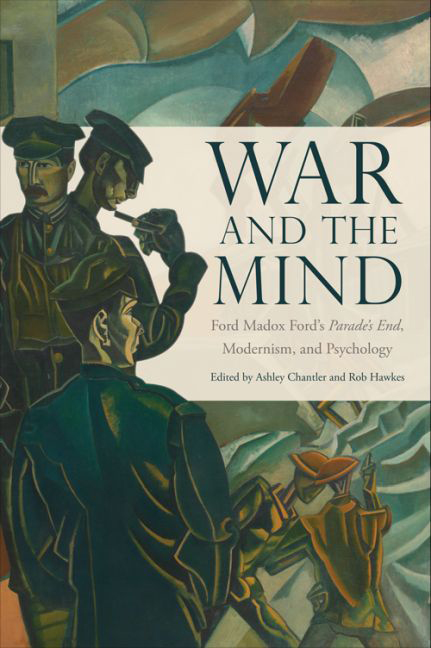Book contents
- Frontmatter
- Contents
- Acknowledgements
- Introduction
- 1 ‘Sex ferocity’ and ‘the sadic lusts of certain novelists’: Sexuality, Sadomasochism, and Suppression in Parade's End
- 2 Freud Madox Ford: Impressionism, Psychoanalytic Trauma Theory, and Ford's Wartime Writing
- 3 Empathy, Trauma, and the Space of War in Parade's End
- 4 Fellow Feeling in Ford's Last Post: Modernist Empathy and the Eighteenth-Century Man
- 5 The Self-Analysis of Christopher Tietjens
- 6 Composing the War and the Mind; Composing Parade's End
- 7 The Work of Sleep: Insomnia and Discipline in Ford and Sassoon
- 8 Representing Shell Shock: A Return to Ford and Rebecca West
- 9 ‘I hate soldiering’: Ford, May Sinclair, and War Heroism
- 10 Peace of Mind in Parade's End
- Notes on Contributors
- Bibliography
- Index
8 - Representing Shell Shock: A Return to Ford and Rebecca West
Published online by Cambridge University Press: 15 September 2017
- Frontmatter
- Contents
- Acknowledgements
- Introduction
- 1 ‘Sex ferocity’ and ‘the sadic lusts of certain novelists’: Sexuality, Sadomasochism, and Suppression in Parade's End
- 2 Freud Madox Ford: Impressionism, Psychoanalytic Trauma Theory, and Ford's Wartime Writing
- 3 Empathy, Trauma, and the Space of War in Parade's End
- 4 Fellow Feeling in Ford's Last Post: Modernist Empathy and the Eighteenth-Century Man
- 5 The Self-Analysis of Christopher Tietjens
- 6 Composing the War and the Mind; Composing Parade's End
- 7 The Work of Sleep: Insomnia and Discipline in Ford and Sassoon
- 8 Representing Shell Shock: A Return to Ford and Rebecca West
- 9 ‘I hate soldiering’: Ford, May Sinclair, and War Heroism
- 10 Peace of Mind in Parade's End
- Notes on Contributors
- Bibliography
- Index
Summary
In 1922, as the spectacularly equivocal report by the War Office Committee of Enquiry into ‘Shell-Shock’ was published, 65,000 ex-soldiers were either hospitalised or drawing disability pensions for war neurosis. Estimates for the total number of First World War soldiers who suffered from shell shock severely enough to require a discharge from the army range from 80,000 to 200,000. Of course these are just the official statistics; as Richard Aldington later said: ‘[w]e talk of shell-shock, but who wasn't shell-shocked, more or less?’ Most soldiers, and many non-combatants, were affected by the sights and sounds of total war, and shell shock was only one manifestation of the harrowing impact of mechanical warfare on the mind.
One of those ‘more or less’ shell-shocked by the war was Ford Madox Ford. He was sent to France in July 1916, after joining the army the previous year, and was ‘blown into the air’ by a shell near Becourt Wood which resulted in a concussion and amnesia so severe he temporarily forgot even his own name. Although he was released from the Casualty Clearing Station at Corbie just thirty-six hours later, Ford would later claim that: ‘I had completely lost my memory so that […] three weeks of my life are completely dead to me.’ He suffered from what he called his ‘nerve tangle’ or ‘Corbie-phobia’
until 1923, the year he began writing Parade's End. Its influence on the tetralogy is clear: Tietjens’ shell shock, manifesting itself like Ford's as amnesia, is a crucial structural aspect of the book's panoramic survey of war and Edwardian society, as well as its literary modernism.
Yet just as Parade's End is in many ways born of its author's direct experience, it seems also to be in dialogue with another earlier exploration of shell shock, Rebecca West's The Return of the Soldier. In a letter to Sylvia Lynd in 1918, soon after her novella was published, West recounts how:
I had a weekend with Violet [Hunt] and Ford during which Ford explained to me elaborately the imperfection of The Return of the Soldier compared to any of his works – a statement with which I profoundly agree but which oughtn't to be made, because it rouses emulation.
- Type
- Chapter
- Information
- War and the MindFord Madox Ford's Parade's End, Modernism, and Psychology, pp. 127 - 141Publisher: Edinburgh University PressPrint publication year: 2015



